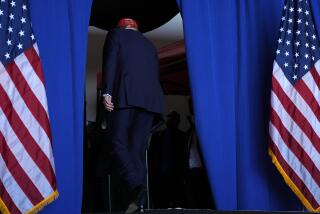The GOP and the perils of populism
- Share via
If Barack Obama wins the presidency next month, Republican strategists probably won’t waste too much time deconstructing the pros and cons of John McCain’s candidacy. McCain is clearly a figure of the past, and that’s most likely where he will remain.
Sarah Palin’s vice presidential candidacy, on the other hand, could haunt the party for some time. Beyond the excitement and attention she garnered in her first two weeks on the stump, Palin hasn’t done much to help McCain argue, as he did in last Tuesday’s debate, that he’s “the steady hand at the tiller.”
That’s partly because, as the vice presidential candidate, her job is less about exhibiting her ability to lead than it is to undermine her opponents’ bona fides. It’s also because her take-no-prisoners populism is inherently radical; it’s at odds not only with McCain’s “I’m safe, he’s an unknown” strategy but with the very things that conservatism claims to be about: stability, order and tradition.
Populists have their appeal. After all, they claim to be trying to take back government for its rightful owners: you and me. If democratic government is “of the people, by the people, for the people,” populists ask, then why the heck isn’t it looking out for us instead of “them”?
But who is “them”? Populists rail against “elite” institutions and figures, but they also inveigh against mediating civic institutions in general.
Like Palin spurning the moderator at the vice presidential debate and insisting that she speak directly to the American people, populists often scorn whatever stands between them and the masses. As they tout the will and wisdom of the people, populists deride the role of professionals, experts and bureaucrats -- from journalists to economists -- in civic life.
In populist political rhetoric, as British political theorist Margaret Canovan has observed, amateurism and lack of experience come off as a political plus rather than a minus. Leveraging the public’s distrust of “the system” -- with its eggheads and overeducated specialists -- populists prefer to speak in simplistic terms about even the most complicated matters. If the wisdom of the people is paramount, then who needs those experts?
The answer, of course, is we do. And to argue otherwise is irresponsible.
I’m not advocating blind trust of the specialists whom we trust to fix our legal problems, our computers and, um, to run our financial system -- Lord knows they, like all humans, are prone to error, stupidity and corruption. But society can’t function if we simply choose to scorn those among us with specialized knowledge.
Disdaining elites is neither a coherent system of government nor a strategy for governance. As one political scientist put it, “democracy is ... not a steam bath of popular feelings.”
Conservatives were once well aware of this fact. In the early 1960s, writers at William F. Buckley Jr.’s National Review knew that conservatism, like all political movements, needs a head as well as a heart. In a confidential memo, Frank Meyer, the National Review’s leading theorist, made distinctions between the “establishment of responsible leadership” and “instinctive” conservatives who followed the call of “know-nothing leaders.” A responsible conservative leadership, Meyer said, needed to tame the “vital forces” of the hard-core populist right.
But nearly half a century later, that generation is gone or fading fast, and McCain’s campaign choices should make us all wonder who is in charge of America’s conservative party now: its heart or its head? It’s not clear that anyone on the right has stepped up to become today’s “responsible cop of the conservative beat,” as one historian described Buckley.
In his 2005 book, “Democracy and Populism,” conservative historian John Lukacs expressed his fear that democracy is degenerating into ersatz populism, which tends to unite people more on the basis of whom they despise rather than what they believe in. Contemporary conservatives, he wrote, have learned to muster majorities by evoking disdain not against foreign but domestic enemies. He suggested that the movement is in the hands of two contending factions: those whose “binding belief” is their contempt for their enemies, who hate them more than they love liberty, and those who love liberty more than they fear their enemies.
If McCain loses, the leaders of the GOP will be forced to reevaluate his lurch toward populism and think about just which kind of conservatism they want their party to represent.
More to Read
A cure for the common opinion
Get thought-provoking perspectives with our weekly newsletter.
You may occasionally receive promotional content from the Los Angeles Times.










